coffee shop equipment list pdf

Launching a successful coffee shop requires careful planning, starting with the right equipment. From espresso machines to grinders, a well-curated list ensures efficiency and quality, setting your business up for long-term success while catering to diverse customer preferences.
1.1 Importance of Coffee Shop Equipment
Coffee shop equipment plays a pivotal role in delivering high-quality beverages and ensuring operational efficiency. The right tools, such as espresso machines and grinders, directly impact the taste and consistency of coffee, which are critical for customer satisfaction. Additionally, proper equipment ensures safety, streamlines workflows, and reduces waste. A well-equipped coffee shop can handle high volumes during peak hours, maintaining service quality. Investing in reliable equipment also supports long-term cost savings by reducing maintenance and repair needs. Furthermore, it allows baristas to experiment with creative drink recipes, enhancing the menu and customer experience. Ultimately, quality equipment is foundational for building a successful and sustainable coffee shop business.
1.2 Purpose of a Coffee Shop Equipment List
A coffee shop equipment list serves as a comprehensive guide, ensuring all necessary tools are acquired for efficient operations. It helps owners prioritize purchases, allocate budgets effectively, and avoid overspending. This list also aids in planning the shop layout and training staff, ensuring smooth workflows. By categorizing equipment into essential and optional items, it simplifies decision-making and resource allocation. A detailed list further assists in maintenance planning and supplier sourcing, ensuring everything runs smoothly from day one. Ultimately, it acts as a roadmap, guiding new entrepreneurs through the complex process of setting up a coffee shop and preparing for long-term success in a competitive market.

Essential Coffee Shop Equipment
Coffee shops rely on core equipment like espresso machines, grinders, brewers, and milk frothing pitchers to deliver high-quality beverages efficiently, ensuring customer satisfaction and smooth operations.
2.1 Espresso Machines
Espresso machines are the heart of any coffee shop, enabling the creation of authentic espresso shots. They come in various types, including manual, semi-automatic, automatic, and super-automatic models. Manual machines offer precise control but require skill, while automatic ones streamline the process for consistency. Key features to consider include temperature control, pressure stability, and built-in grinders for freshly ground beans. High-quality machines ensure optimal extraction, delivering rich flavors and crema. Proper maintenance, such as regular cleaning and descaling, is essential to prolong lifespan and performance. Investing in a reliable espresso machine is crucial for efficiency, customer satisfaction, and maintaining the reputation of your coffee shop.
2.2 Coffee Grinders
Coffee grinders are essential for freshly grinding coffee beans, ensuring optimal flavor and aroma. There are two main types: blade and burr grinders. Blade grinders are affordable but may generate heat, potentially affecting flavor. Burr grinders are more precise, offering consistent grind sizes and better temperature control. Key features include adjustable grind settings, capacity, and ease of cleaning. For commercial use, high-capacity grinders with robust motors are recommended. Regular maintenance, such as cleaning burrs and ensuring proper alignment, is crucial for longevity and performance. Investing in a quality grinder complements your espresso machine, ensuring every shot is crafted to perfection. Freshly ground beans are vital for delivering exceptional coffee experiences to your customers.
2.3 Coffee Brewers
Coffee brewers are fundamental for preparing high-quality coffee in large quantities. They come in various types, including drip brewers, pour-over, French press, and chemex. Drip brewers are ideal for high-volume coffee shops, offering convenience and consistent results. Pour-over and French press methods allow for more control over flavor and are popular in specialty coffee settings. Chemex brewers are known for clean extraction and a smooth taste. When selecting a brewer, consider factors like capacity, brewing speed, temperature control, and ease of cleaning. Investing in a reliable coffee brewer ensures consistent flavor and efficiency, directly impacting customer satisfaction. Regular maintenance and proper training on equipment use are essential for optimal performance.
2.4 Espresso Accessories
Espresso accessories are vital for enhancing the quality and consistency of your coffee offerings. Essential items include portafilters, tampers, steam wands, and cleaning tools like group head brushes. These tools ensure precise extraction and maintain hygiene standards. Portafilters hold the coffee grounds securely, while tampers guarantee even pressure for consistent flavor. Steam wands are crucial for frothing milk to create lattes and cappuccinos. Cleaning tools prevent residue buildup, extending equipment lifespan. When compiling your coffee shop equipment list, consider suppliers offering durable, high-quality accessories. Budget appropriately, as investing in superior tools yields better results and customer satisfaction. These accessories are indispensable for any professional coffee setup.
2.5 Coffee Makers
Coffee makers are fundamental to any coffee shop, providing a reliable way to brew high-quality coffee. They come in various types, including drip brewers, pour-over machines, and single-serve units. Drip brewers are ideal for high-volume settings, offering consistent results and large capacities. Pour-over machines allow for more manual control, catering to specialty coffee enthusiasts. Single-serve machines, like those using pods, offer convenience and variety. When selecting a coffee maker, consider factors like brewing speed, capacity, and programmable features. Ensure it aligns with your shop’s needs, whether you prioritize efficiency or customization. Easy cleaning and durability are also crucial for maintaining performance. Including a coffee maker in your equipment list ensures you can meet diverse customer preferences effectively.
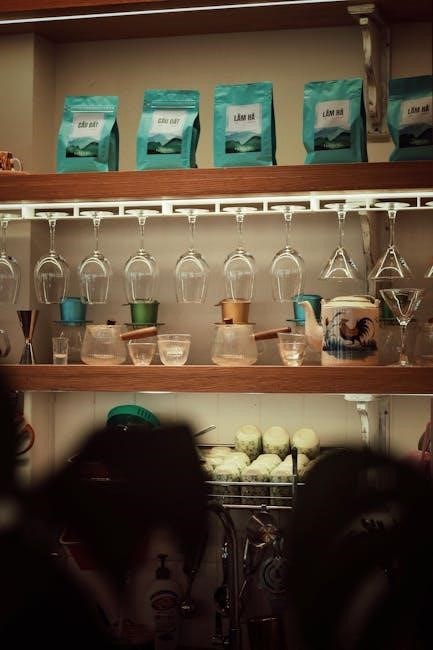
2;6 Milk Frothing Pitchers
Milk frothing pitchers are essential tools for creating silky, velvety milk foam, a cornerstone of specialty coffee drinks like cappuccinos and lattes. Available in various sizes, these pitchers are typically made of stainless steel or ceramic, offering durability and heat retention. A good pitcher features a sturdy handle for easy pouring and a spout for precise control. When selecting, consider the size that matches your shop’s volume and the material that aligns with your needs. Regular cleaning and sanitizing are crucial to prevent bacterial growth and maintain hygiene. Including milk frothing pitchers in your equipment list ensures baristas can craft high-quality beverages efficiently, enhancing the overall customer experience. They are a must-have for any coffee shop aiming to deliver consistent, professional results.
2.7 Water Filtration Systems
Water filtration systems are crucial for ensuring the quality and taste of coffee in your shop. Impurities in water can alter the flavor of brewed coffee, making filtration essential for consistency. These systems remove minerals and contaminants that can affect taste and damage equipment over time. Common types include activated carbon filters, reverse osmosis systems, and ion exchange systems. Each has its benefits, such as reducing chlorine, heavy metals, or limescale buildup. A good filtration system also protects espresso machines and brewers from mineral scaling, extending their lifespan. Investing in a reliable water filtration system ensures your coffee tastes its best and your equipment runs smoothly. It’s a vital addition to any coffee shop equipment list for maintaining quality and operational efficiency.
2.8 Coffee Bean Storage Containers
Coffee bean storage containers are essential for maintaining the freshness and quality of your coffee beans. Exposure to air, moisture, and light can degrade the beans, so airtight containers are crucial. Stainless steel or glass containers with tight-fitting lids are ideal for storing beans, as they prevent contamination and preserve aroma. The size of the container should match the quantity of beans to avoid excess air exposure. Proper storage also helps maintain consistent flavor in brewed coffee. Clean, dry containers are vital to prevent mold and spoilage. Investing in high-quality storage solutions ensures your coffee beans remain fresh longer, which is key to serving superior brews and satisfying customers. This makes storage containers a must-have in any coffee shop equipment list.
2.9 Scales for Measuring Coffee
Scales for measuring coffee are indispensable for achieving precise brewing results. They ensure consistency in portion control, which directly impacts the flavor and quality of every cup. Digital scales are preferred for their accuracy and ease of use, allowing baristas to measure coffee and water with precision. Manual scales are also an option, though less common in modern coffee shops. Scales enable baristas to monitor extraction times and ratios, crucial for crafting perfect espresso shots and pour-overs. Investing in a durable, easy-to-clean scale is essential for maintaining efficiency and hygiene in a busy coffee environment. Including a reliable scale in your coffee shop equipment list guarantees consistent, high-quality brews that satisfy discerning customers.
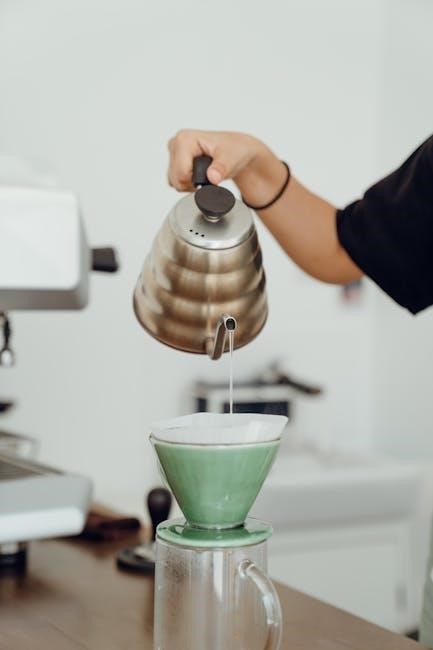
Additional Equipment for a Coffee Shop
Additional equipment like POS systems, refrigeration, and dishwashers are essential for streamlining operations, enhancing efficiency, and improving customer experience, ensuring your coffee shop runs smoothly and successfully.
3.1 Point of Sale (POS) Systems
A reliable POS system is crucial for managing transactions efficiently in a coffee shop. It streamlines processes like tracking sales, managing inventory, and handling customer payments seamlessly. Modern POS systems offer features such as receipt printing, digital menu integration, and loyalty program management, enhancing both operational efficiency and customer satisfaction. Additionally, cloud-based POS solutions provide real-time data access and remote management capabilities, which are vital for monitoring business performance. Investing in a robust POS system ensures smooth day-to-day operations and supports long-term business growth. By integrating with other equipment and tools, it becomes an indispensable component of your coffee shop setup.
3.2 Refrigeration Units
Refrigeration units are essential for maintaining the freshness and quality of dairy products, milk, and perishable ingredients in a coffee shop. They ensure that items like cream, milk, and pastries remain at optimal temperatures, preventing spoilage and maintaining flavor. Commercial refrigerators, freezers, and display cases are common types used, each serving specific needs. Energy-efficient models are recommended to reduce operational costs while minimizing environmental impact. Proper sizing and capacity are crucial, as they must accommodate daily inventory without compromising performance. Regular maintenance, such as cleaning condenser coils and checking door seals, is vital to extend the lifespan of these units. Investing in high-quality refrigeration ensures consistent product quality and customer satisfaction.
3.3 Dishwashers
Dishwashers are crucial for maintaining hygiene and efficiency in a coffee shop. Commercial-grade dishwashers are designed to handle high volumes of dishes, utensils, and equipment, ensuring everything is sanitized and ready for reuse. They operate at high temperatures to eliminate bacteria and food residue, which is essential for health standards. Energy-efficient models are recommended to reduce water and electricity consumption. Under-counter dishwashers are ideal for small spaces, while larger, standalone units suit busier establishments. Features like multiple wash cycles and drying options enhance functionality. Regular maintenance, such as cleaning filters and checking for worn parts, is necessary to ensure optimal performance and longevity. Investing in a reliable dishwasher supports a clean, efficient, and sustainable coffee shop environment.
3.4 Blenders
Blenders are essential equipment for coffee shops offering smoothies, milkshakes, or frozen beverages. High-powered blenders are necessary for handling tough ingredients like frozen fruits and ice. Look for models with multiple speed settings to ensure versatility in preparing various recipes. Stainless steel blades and durable construction are crucial for longevity. A BPA-free pitcher is a must for safety and hygiene. Easy-to-clean designs with dishwasher-safe parts save time and effort. Quiet operation is beneficial for maintaining a pleasant customer environment. Regular maintenance, such as sharpening blades and replacing worn seals, ensures optimal performance. Blenders should be selected based on the volume of drinks served and the types of ingredients used. They are a key addition to any coffee shop aiming to expand its menu beyond traditional coffee drinks.
3.5 Microwaves
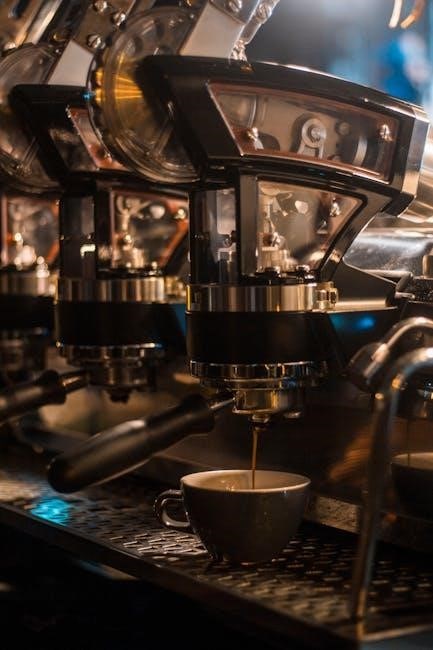
Microwaves are practical additions to coffee shops, offering convenience for heating pastries, milk, and other items quickly. They enhance efficiency during peak hours, ensuring fast service without compromising quality. Commercial-grade microwaves are recommended for their durability and higher power output, which handles frequent use. Look for models with multiple power levels and preset settings to accommodate various heating needs. Compact designs save counter space, crucial in busy environments. Easy-to-clean interiors and durable construction are essential for maintaining hygiene and longevity. Additionally, features like automatic shut-off and child safety locks ensure safe operation. While not the most glamorous equipment, microwaves are versatile tools that support a smooth workflow and customer satisfaction.
3.6 Ice Makers
Ice makers are essential for coffee shops serving cold beverages like iced coffee, frappes, and chilled drinks. They ensure a steady supply of fresh ice, preventing the need to replenish manually. Commercial-grade ice makers are designed for high-volume use, offering durability and efficiency. Under-counter or standalone units are popular choices, depending on space constraints. Energy-efficient models reduce operational costs while maintaining performance. Proper maintenance, such as regular cleaning and scale prevention, is crucial for longevity. Investing in a reliable ice maker enhances workflow and keeps up with customer demand during peak hours, making it a vital addition to your coffee shop equipment list.
3.7 Food Processors
Food processors are versatile additions to coffee shop kitchens, enabling efficient preparation of ingredients for baked goods, sandwiches, and other menu items. They can chop, slice, or puree ingredients quickly, saving time and ensuring consistency. Compact models are ideal for small spaces, while heavy-duty processors handle larger volumes. Many come with interchangeable attachments for various tasks, such as dough mixing or shredding. Quiet operation and easy cleanup features are beneficial in busy environments. Investing in a reliable food processor streamlines food prep, allowing baristas to focus on crafting beverages. Regular maintenance, like sharpening blades and cleaning parts, ensures longevity and optimal performance, making it a practical addition to your coffee shop equipment list.
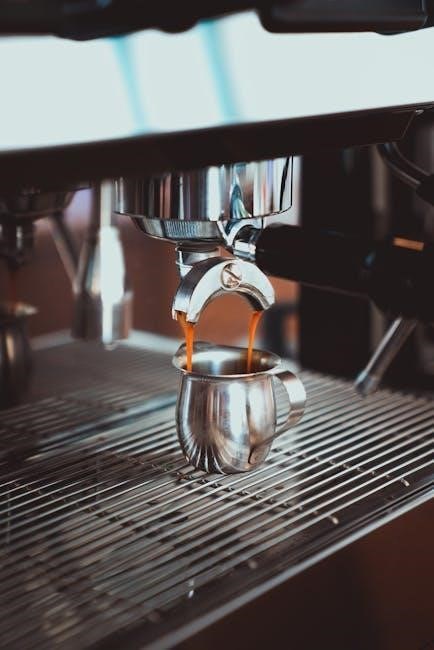
Maintenance and Care of Coffee Shop Equipment
Regular maintenance ensures equipment longevity, optimal performance, and hygiene. Cleaning, descaling, and replacing parts are essential for preserving functionality and preventing costly repairs. A detailed coffee shop equipment list PDF often includes maintenance schedules and tips to keep your gear in top shape, ensuring consistent quality and customer satisfaction.
4.1 Cleaning Tools for Equipment
Cleaning tools are essential for maintaining coffee shop equipment. Brushes, microfiber cloths, and cleaning solutions are must-haves for daily upkeep. These tools help remove residue, old coffee oils, and bacteria, ensuring optimal performance. Water filters and descaling solutions prevent mineral buildup, while steam wand cleaners sanitize and maintain hygiene. A well-stocked cleaning kit extends equipment lifespan and maintains flavor quality. Regular use of these tools prevents equipment failure and ensures consistent customer satisfaction. Incorporating cleaning tools into your coffee shop equipment list PDF guarantees a clean, efficient, and hygienic workspace. Proper maintenance with the right tools is vital for delivering high-quality beverages and prolonging equipment durability.
4.2 Maintenance Schedules
Maintenance schedules are critical for ensuring coffee shop equipment operates efficiently and lasts longer. Daily tasks include cleaning espresso machines, descaling brewers, and checking grinder burrs. Weekly, inspect steam wands, lubricate moving parts, and sanitize surfaces. Monthly, perform deep cleaning, replace worn parts, and run diagnostic tests. A well-structured schedule prevents unexpected breakdowns, reduces downtime, and ensures consistent drink quality. Regular maintenance also prevents costly repairs and extends equipment lifespan. By incorporating a maintenance checklist into your coffee shop equipment list PDF, you can track tasks and ensure everything runs smoothly. A proactive approach to maintenance is key to delivering excellent customer service and maintaining operational efficiency.
4.3 Importance of Regular Maintenance
Regular maintenance is vital for ensuring coffee shop equipment functions optimally and consistently. Proper upkeep prevents equipment breakdowns, reduces downtime, and maintains drink quality. Neglecting maintenance can lead to costly repairs, safety hazards, and even equipment failure. Cleanliness is also crucial, as residue and scale buildup can affect flavor and hygiene. Regular maintenance extends the lifespan of equipment, reduces energy consumption, and ensures compliance with health standards. By prioritizing maintenance, coffee shops can deliver consistent customer experiences, avoid financial losses, and maintain a safe working environment. Incorporating maintenance into your coffee shop equipment list PDF ensures accountability and helps staff stay organized. It’s an investment in the longevity and efficiency of your business.
4.4 DIY vs. Professional Maintenance Services
When it comes to maintaining coffee shop equipment, owners must decide between DIY maintenance and hiring professionals. DIY maintenance can be cost-effective for simple tasks like cleaning or replacing small parts, allowing staff to handle routine upkeep. However, complex issues like espresso machine repairs often require professional expertise to avoid further damage. Professional services ensure proper fixes, extend equipment lifespan, and provide warranties, but they can be costly. Balancing DIY and professional maintenance is key: staff can manage daily tasks, while professionals handle major repairs. This approach saves money, ensures efficiency, and keeps equipment in optimal condition. Regularly assessing equipment needs helps determine the best maintenance strategy for your coffee shop.

Suppliers and Budget Considerations
Selecting reputable suppliers ensures high-quality equipment, while budgeting helps allocate resources effectively. Compare prices, negotiate terms, and consider leasing options to optimize your coffee shop’s financial planning.
5.1 Where to Buy Coffee Shop Equipment
Purchasing high-quality coffee shop equipment is crucial for your business’s success. You can find reliable suppliers through online marketplaces, specialty coffee retailers, or directly from manufacturers. Local distributors and trade shows are also excellent sources. Additionally, consider auctions or second-hand sellers for cost-effective options. Always research suppliers to ensure they offer warranties, after-sales support, and certified products. Prioritize purchasing from reputable brands known for durability and performance to avoid costly repairs. Comparing prices and reading reviews can help you make informed decisions. Ensure the equipment aligns with your shop’s needs and budget for long-term efficiency and customer satisfaction.
5.2 Budgeting for Equipment Purchases
Budgeting for coffee shop equipment is a critical step in planning your business. Start by estimating costs for essential items like espresso machines, grinders, and brewers. Research prices from multiple suppliers to find the best value. Consider the equipment’s durability, performance, and warranty. Allocate funds for both upfront purchases and long-term maintenance. Prioritize must-have equipment over optional items to stay within your budget. Leasing options can help reduce initial costs. Additionally, set aside a contingency fund for unexpected expenses. A well-planned budget ensures your coffee shop is equipped to deliver quality while maintaining financial stability. Balancing cost and quality is key to long-term success.

5.3 Leasing Options for Equipment
Leasing equipment is a viable option for coffee shops aiming to reduce upfront costs. It allows businesses to access high-quality machinery without significant initial investments. Leasing agreements often include maintenance and upgrades, ensuring equipment stays functional and up-to-date. This option is particularly beneficial for new businesses or those with limited capital. Monthly payments can be tax-deductible as operational expenses, offering financial flexibility. Leasing also enables coffee shops to adapt to trends without long-term commitments. However, it’s important to review lease terms carefully, as they may include hidden fees or restrictive conditions. Exploring leasing options can help balance budget constraints with the need for reliable equipment, supporting long-term business growth and profitability.

Sample Coffee Shop Equipment List PDF
A sample coffee shop equipment list PDF provides a comprehensive overview of essential items, from espresso machines to grinders, helping owners plan and budget effectively for their business.
6.1 Categorizing Equipment for the List
Categorizing equipment for a coffee shop list involves organizing items by function and priority. Begin with essential machinery like espresso machines and grinders, followed by brewers and milk frothing pitchers. Additional equipment, such as POS systems and refrigeration units, should be grouped separately to streamline budgeting and purchasing processes. This structured approach ensures that all necessary tools are accounted for, making it easier to identify must-haves versus optional items. Proper categorization also helps in creating a realistic budget and timeline for acquiring equipment, ensuring a smooth setup process for the coffee shop.
6.2 Prioritizing Equipment Purchases
Prioritizing equipment purchases is crucial to ensure your coffee shop operates smoothly from day one. Start with essential items like espresso machines, grinders, and brewers, as these are fundamental to your core offerings. Secondary equipment, such as milk frothing pitchers and water filtration systems, should follow to enhance service quality. Consider future growth by allocating budgets for optional items like blenders or ice makers. By prioritizing, you can manage costs effectively and ensure that critical tools are in place before less urgent purchases. This strategic approach helps create a balanced setup that meets immediate needs while allowing flexibility for expansion based on customer demand and business growth. Proper prioritization ensures efficiency and customer satisfaction from the start.
6.3 Customizing the Equipment List
Customizing your coffee shop equipment list ensures it aligns with your unique business needs and goals. Start by evaluating your menu, shop size, and target audience to determine essential items. For example, if you plan to serve specialty drinks, prioritize high-quality espresso machines and grinders. If your shop is small, consider compact or multi-functional equipment to save space. Additionally, factor in your budget to allocate resources effectively, ensuring you invest in durable, long-term solutions. Optional equipment, like blenders or ice makers, can be added later as your business grows. By tailoring your list, you create a setup that maximizes efficiency, supports your menu, and enhances the overall customer experience, setting your shop up for success from day one.
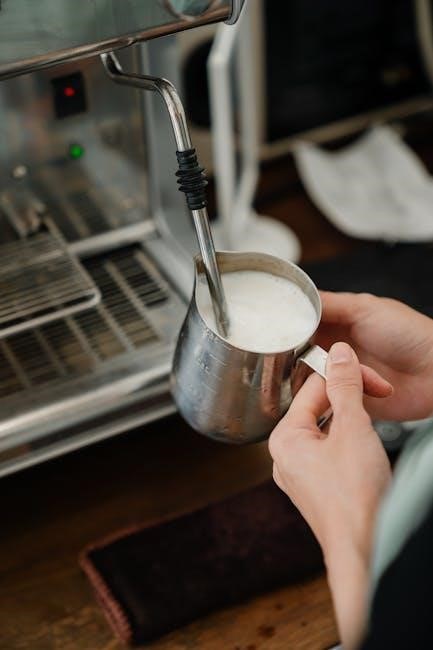
A well-prepared coffee shop equipment list is key to launching and maintaining a thriving business. Ensure each item aligns with your vision for quality, efficiency, and customer satisfaction.
7.1 Final Thoughts on Coffee Shop Equipment
Investing in the right coffee shop equipment is crucial for delivering exceptional beverages and ensuring operational efficiency. A comprehensive equipment list, including espresso machines, grinders, and brewers, helps streamline processes. Regular maintenance and staff training are essential for prolonging equipment lifespan and maintaining quality. Budgeting wisely and considering long-term costs can prevent financial strain. Leasing options offer flexibility for new businesses, while high-quality equipment ensures customer satisfaction. By prioritizing equipment needs and creating a detailed list, you set your coffee shop up for success, enabling it to thrive in a competitive market. Remember, quality equipment is an investment in your business’s future.
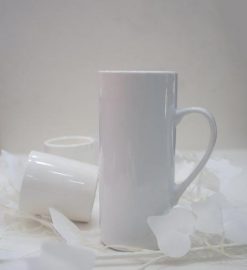


Leave a Reply
You must be logged in to post a comment.